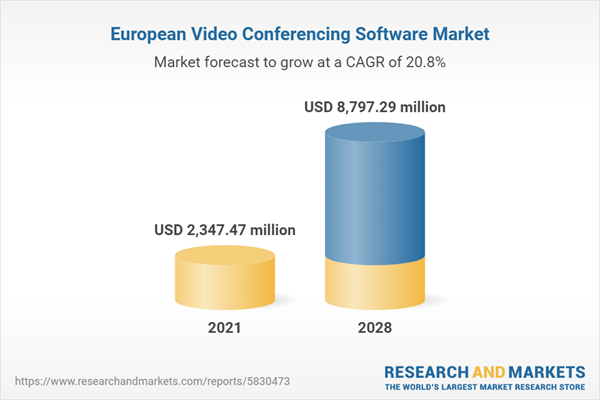The Europe video conferencing software market is estimated to grow at a CAGR of 20.77% from US$2,347.47 million in 2021 to US$8,797.29 million by 2028.
Video conferencing is a real-time visual communication interaction between one or more people, regardless of where they are physically located. Integrating innovative technologies such as the Internet of Things (IoT), artificial intelligence (AI), and cloud technology is expected to augment the market growth over the forecast period. There has been an increase in demand for visual communication due to globalization, remote workforce management, and rising internet penetration. Video conferencing solutions help businesses and organizations make faster choices by removing the high costs of traveling from one location to another for meetings. The increasing rate of industrialization in Europe is anticipated to scale the businesses in the area and would accelerate the adoption of video conferencing systems. The Europe video conferencing market has experienced significant growth in recent years due to expanding digitization and the rising use of video conferencing solutions in education, healthcare, and the business sector.The Europe video conferencing software market is driven by the increasing trend of work-from-home and online learning.
The prime factor driving Europe's video conferencing software market growth is the surging trend of work-from-home and online learning. The increased initiatives by the European governments concerning remote work are anticipated to boost market expansion during the forecast period. For instance, as per the updated Ministry of Labour's Guidelines, all companies operating in France must ensure that each employee works remotely at least three days per week for three weeks from January 2022. In January 2020, video and collaboration options were added to FreeConferenceCall.com's free conference calling service for subscribers in the United Kingdom and France. Moreover, the UK government has recognized the importance of remote work and virtual communication solutions and has invested in initiatives to promote adoption.More educational institutions are collaborating with video communication companies to extend remote learning due to the pandemic's impact. As a result, given the current environment, educational institutions must implement robust software to provide an efficient learning experience. Furthermore, video conference solutions allow teachers to share displays, documents, and files while educating.
Market Developments:
- In 2020, the UK government launched a £400 million Digital Infrastructure Investment Fund to accelerate the deployment of full-fiber broadband and 5G networks across the country, enabling businesses to access high-speed internet and support the adoption of video conferencing software.
- In April 2020, the Indo-French cultural center Alliance Française (AF) took its classes online during the lockdown, allowing as many as 30,000 people to learn French online from home and shifting a crisis into a favorable opportunity.
- In March 2021, a Spanish mobile operator launched Doctor Go telemedicine service, a family package telemedicine service for its customers. It offers video consultations with specialists and family doctors at only €6 per month.
The healthcare segment is expected to witness robust growth during the forecast period.
The demand for video conferencing software in Europe has increased significantly due to the growing trend of remote consultations in the healthcare industry. Several factors drive this trend, including the need to improve access to healthcare, reduce costs, and increase efficiency. Remote consultations allow healthcare providers to connect with patients who cannot physically visit their offices due to distance or other factors. In addition to the need for improving access to healthcare, remote consultations also help to reduce costs and increase efficiency. For example, healthcare providers can save time and money by reducing the need for travel and administrative tasks associated with in-person consultations. This can ultimately lead to better patient outcomes and more effective use of healthcare resources.According to OECD Health Statistics 2021, medical graduates in Italy are increasing every year, which has increased by 30% in 2019 from 2016. This growing medical education and training trend is also driving the demand for video conferencing software in Europe. Medical education and training are essential for healthcare professionals to stay up-to-date with medical advances and techniques.
The UK is one of the major markets for video conferencing solutions.
In the UK, the adoption of video conferencing software has seen a sharp increase, with many businesses implementing these solutions to enable remote work and maintain business continuity during the pandemic. According to a study by YouGov, 49% of UK employees worked from home at least once a week during the pandemic, with 35% using video conferencing software to communicate with colleagues. The same study also found that 56% of UK employees believed that remote work positively impacted their work-life balance.Market Segmentation:
BY DEPLOYMENT MODEL
- On-Premise
- Cloud
BY ENTERPRISE SIZE
- Small
- Medium
- Large
BY INDUSTRY VERTICAL
- Education
- Communication and Technology
- Defense
- Healthcare
- BFSI
- Others
BY COUNTRY
- Germany
- France
- UK
- Italy
- Spain
- Others
Table of Contents
Companies Mentioned
- Zoom Video Communications, Inc.
- Livestrom
- Hopin
- Wonder
- Teooh
- Whereby
- Microsoft Corporation
- Cisco
- Zoho Corporation Pvt. Ltd.
Table Information
| Report Attribute | Details |
|---|---|
| No. of Pages | 95 |
| Published | June 2023 |
| Forecast Period | 2021 - 2028 |
| Estimated Market Value ( USD | $ 2347.47 million |
| Forecasted Market Value ( USD | $ 8797.29 million |
| Compound Annual Growth Rate | 20.7% |
| Regions Covered | Europe |
| No. of Companies Mentioned | 10 |









